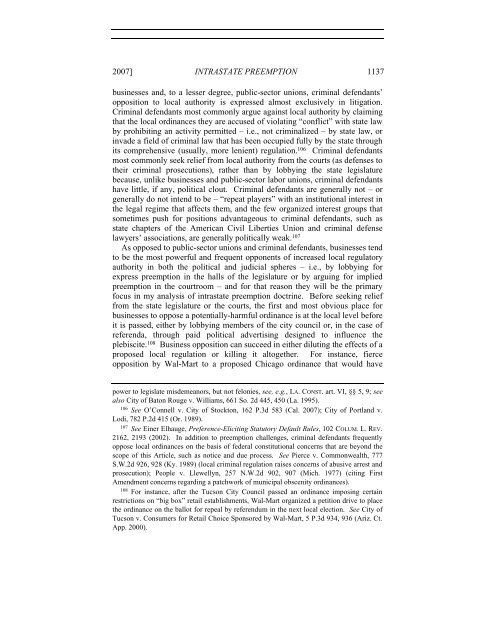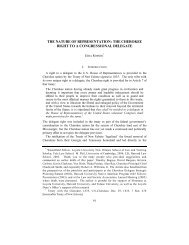INTRASTATE PREEMPTION
INTRASTATE PREEMPTION
INTRASTATE PREEMPTION
- No tags were found...
You also want an ePaper? Increase the reach of your titles
YUMPU automatically turns print PDFs into web optimized ePapers that Google loves.
2007] <strong>INTRASTATE</strong> <strong>PREEMPTION</strong> 1137businesses and, to a lesser degree, public-sector unions, criminal defendants’opposition to local authority is expressed almost exclusively in litigation.Criminal defendants most commonly argue against local authority by claimingthat the local ordinances they are accused of violating “conflict” with state lawby prohibiting an activity permitted – i.e., not criminalized – by state law, orinvade a field of criminal law that has been occupied fully by the state throughits comprehensive (usually, more lenient) regulation. 106 Criminal defendantsmost commonly seek relief from local authority from the courts (as defenses totheir criminal prosecutions), rather than by lobbying the state legislaturebecause, unlike businesses and public-sector labor unions, criminal defendantshave little, if any, political clout. Criminal defendants are generally not – orgenerally do not intend to be – “repeat players” with an institutional interest inthe legal regime that affects them, and the few organized interest groups thatsometimes push for positions advantageous to criminal defendants, such asstate chapters of the American Civil Liberties Union and criminal defenselawyers’ associations, are generally politically weak. 107As opposed to public-sector unions and criminal defendants, businesses tendto be the most powerful and frequent opponents of increased local regulatoryauthority in both the political and judicial spheres – i.e., by lobbying forexpress preemption in the halls of the legislature or by arguing for impliedpreemption in the courtroom – and for that reason they will be the primaryfocus in my analysis of intrastate preemption doctrine. Before seeking relieffrom the state legislature or the courts, the first and most obvious place forbusinesses to oppose a potentially-harmful ordinance is at the local level beforeit is passed, either by lobbying members of the city council or, in the case ofreferenda, through paid political advertising designed to influence theplebiscite. 108 Business opposition can succeed in either diluting the effects of aproposed local regulation or killing it altogether. For instance, fierceopposition by Wal-Mart to a proposed Chicago ordinance that would havepower to legislate misdemeanors, but not felonies, see, e.g., LA. CONST. art. VI, §§ 5, 9; seealso City of Baton Rouge v. Williams, 661 So. 2d 445, 450 (La. 1995).106 See O’Connell v. City of Stockton, 162 P.3d 583 (Cal. 2007); City of Portland v.Lodi, 782 P.2d 415 (Or. 1989).107 See Einer Elhauge, Preference-Eliciting Statutory Default Rules, 102 COLUM. L. REV.2162, 2193 (2002). In addition to preemption challenges, criminal defendants frequentlyoppose local ordinances on the basis of federal constitutional concerns that are beyond thescope of this Article, such as notice and due process. See Pierce v. Commonwealth, 777S.W.2d 926, 928 (Ky. 1989) (local criminal regulation raises concerns of abusive arrest andprosecution); People v. Llewellyn, 257 N.W.2d 902, 907 (Mich. 1977) (citing FirstAmendment concerns regarding a patchwork of municipal obscenity ordinances).108 For instance, after the Tucson City Council passed an ordinance imposing certainrestrictions on “big box” retail establishments, Wal-Mart organized a petition drive to placethe ordinance on the ballot for repeal by referendum in the next local election. See City ofTucson v. Consumers for Retail Choice Sponsored by Wal-Mart, 5 P.3d 934, 936 (Ariz. Ct.App. 2000).









